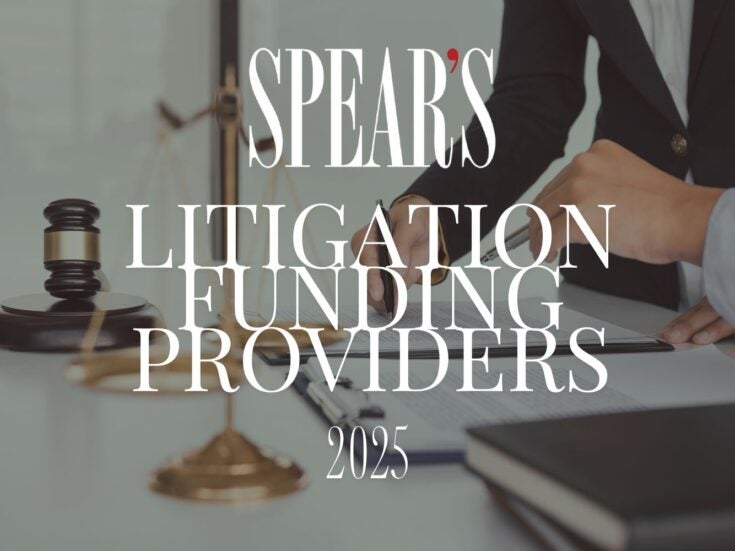
Following the news that the Law Commission has suggested divorce settlements could be calculated through a mathematical formula, we have expert reaction on what this might mean for Spear’s readers
Commenting on today’s paper, Suzanne Todd, partner in the Family Law team at Withers LLP said:
‘This is the first time an official body has called for a review of spousal maintenance and its duration. The ‘generosity’ of the English Family Courts since 2000 has resulted in high levels of maintenance being awarded, often for a party’s lifetime. The report is critical of how this area of law has developed and we may end up heading towards a system which uses a formula as a starting point to calculate the amount of maintenance payable.
‘Practitioners and individuals who are caught up in divorce proceedings will welcome greater certainty in this area rather than trying to navigate through the choppy waters of family law as it stands today.
‘The Law Commission’s final report will result in valuable guidance in this area and hopefully lead to law reform to provide certainty for separating couples.
‘If the Law Commission’s critique of spousal maintenance is translated into law, that would be very welcome news to many working divorcees who see the effect of the current regime as a millstone which provides a meal ticket for life.’
Partner Suzanne Kingston added:
‘It’s interesting that the report focuses on the generous approach towards joint lives maintenance in England and Wales and emphasises the need to review this. This will bring us into line with other jurisdictions and perhaps detract from one of the main reasons that London is seen as being the divorce capital of the world.
‘Practitioners have for some time been concerned about the differing approaches taken by the courts in England and Wales regarding the duration of spousal maintenance. A review of the law in this area is welcomed.’
Nicola Harries, Partner in the Family department at Stevens & Bolton LLP:
‘The Law Commission’s proposals are good news.
‘Recommending making prenups binding means greater autonomy for those who don’t want to lose control of their finances as a result of getting married. Although there is still bound to be a lot of debate in parliament and the press over whether prenups undermine marriage, the proposed change could encourage wealthy partners to take the plunge and marry, where before they would have been very resistant to the idea.
‘These recommendations should mean the end of the ‘meal ticket’ for life maintenance awards that some judges still make. Hopefully they will also encourage the weaker financial party towards independence and perhaps, beyond that, it will make everyone consider whether they should be financially dependent upon their spouse, even during a marriage.
‘More and more couples work and share care of the children as a matter of course (or necessity) but these recommendations might be just what is needed to stop orders being made that award (or reward) an ex-spouse with an order giving maintenance for life. Once that order is made the ex-spouse has no incentive whatsoever to work or to try to become independent even if they have the ability to do so. Bringing joint lives orders to an end years later is still a very difficult thing to achieve and breeds resentment.
‘The Holy Grail of family law is certainty. These proposals move us in the right direction. However, even if the Government introduces a formulaic guidelines to calculate maintenance entitlement, I would still predict fertile ground for argument between parties and their lawyers – although the parameters might be narrowed.’
James Freeman, Partner and Head of Family at Speechly Bircham LLP:
‘The Law Commission’s consultation document seems to have caused a flurry of over-excitement in the national press, who seem to have taken it as a solid proposal for a fairly savage restriction on divorce pay-outs, especially in big-money cases. It’s not that. It’s a consultation document seeking views as to (1) how to define financial ‘needs’ in the divorce context – e.g. is it compensation for economic loss or the ‘standard of living to which you’ve become accustomed’? How long should maintenance go on for? etc; (2) can the level of ‘needs’ be made clearer by introducing a formula-based approach, and (3) How should ‘non-matrimonial property’ (inheritances, pre-marital wealth and the like) be viewed.
‘The consultation paper does not suggest that financial claims be limited in future to ‘needs’, but does note that in most cases there is not enough money around to do any more than meet needs – if indeed you can do that. In the big cases that excite the papers, where there is more than anyone needs, broader sharing would still come into play.
‘One vitally important rejoinder to some newspaper coverage we have seen this morning is needed, which refers to a case called Kernott v Jones as one of the wellsprings for this consultation. Kernott and Jones were an unmarried couple and their case had precisely nothing to do with the law of financial provision on divorce. The mis-reporting of this could perpetuate the damaging myth that unmarried couples are treated as ‘common law spouses’. This is wrong, and dangerously wrong.’
More expert reaction as it comes in
Don’t miss out on the best of Spear’s articles – sign up to the Spear’s weekly newsletter
[related_companies]






